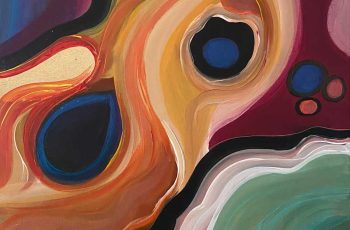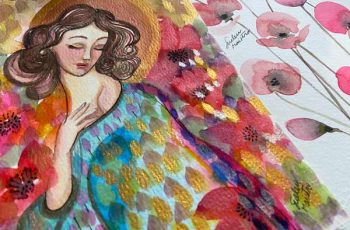Bohemian Rhapsody is a beautiful song by Queen. Crime and Punishment is a divine book written by Dostoevsky. Both are works of art—one from music, the other from literature. But what if they had something in common? What if Freddie Mercury created this song inspired by Crime and Punishment?
It’s been a while since I last wrote here on my blog. Blogging hasn’t felt like a passion for a long time now. I’ve been dedicating myself to adapting to my new life in Ireland with my husband and son, and especially to painting, something I’ve always loved. In fact, the artwork that illustrates this post is a painting I made, inspired by the very idea I’m sharing in this article. This morning, I was listening to music with my husband before we started our workday, and he asked if I still liked Queen. I instantly replied: of course I do.
He asked because I’ve been on a super spiritualist vibe lately, listening to a lot of alternative music that brings a more positive and uplifting vibration internally, part of my healing process from a depression I’ve been dealing with for a few months now. Yes, I’m recovering from depression. Who the hell has the guts to talk about that openly? Well… me.
So, without further ado, I told him I really love Bohemian Rhapsody by Queen, but that lately, the lyrics felt a bit too depressive for this phase of mine. Still, I wanted to listen to it because I love the musical arrangement, the melody, the entire atmosphere of this masterpiece by Freddie Mercury.
As soon as it started playing, the insight hit me like a bolt of lightning: Could Bohemian Rhapsody by Queen be a poetic reference to Crime and Punishment by Dostoevsky?
In my mind, probably.
It struck me hard. (sorry, I’m just a methodical woman)Let’s get back to the core insight. Since my buddy Freddie never (as far as I know) mentioned this reference and we creatives know very well that we don’t really like to reveal our sources, I’ll just assume I’m right for a couple of minutes. Let’s go…
Bohemian Rhapsody and what?
The song starts with a confession of murder. I read Crime and Punishment many years ago. I was about 21 or 22, I think… I used to read on the train from São Paulo’s east zone to the south zone, on my way to work in advertising agencies, earning almost nothing and working myself to death (okay, I’ll stop digressing). Anyway, that book marked me deeply, it was intense and visceral. Freddie created something very similar (among many other great songs). Bohemian Rhapsody is about a character who moves through the entire song shifting between guilt, escape, rage, surrender… calling out to his mother… and it all ends in nihilism:
“Nothing really matters…”
Sound familiar? If you’ve read Crime and Punishment, you’ll catch the reference instantly.
And if you haven’t, here’s a heads-up: it’s a dense read. I don’t even know what crossed my mind when I picked that book back then, but I don’t regret it.
Freddie (yes, I’m calling him by his first name, because we Brazilians love to do that, and maybe even give him a cute nickname, haha) channeled a kind of visceral rock opera in this piece. And it’s exactly the same archetype Dostoevsky explored in Raskolnikov: the morally collapsing human, crushed by the weight of his own existence. A wandering body in pure soul-suffering, crying out for something too deep for shallow thoughts.
Both works speak of immense, burning, painful guilt that won’t shut up. These characters live in inner conflict between what they are, what they did, and what they try to justify. It’s not justice that comes from the law, although both are outside it, but a higher justice, from another dimension, from spirit.
They suffer as incarnated spirits who realize they messed up so badly, they’ll probably have to come back and make up for it. Help!
In Bohemian Rhapsody, multiple voices overlap, creating something divine to listen to, yet it feels like an inner trial.
In Crime and Punishment, Raskolnikov’s deliriums are the opera of his own conscience. You read and read, and get lost in desperate waves of thought.
They want redemption. They’re like spirits (as I said before), defying the rules of the flesh. They scream, go silent, break down and still wonder if any of it was worth it in the end.
So yes, I made a thread connecting progressive rock to 19th-century Russian literature. Pop existentialism, art, guilt. Abyss and beauty colliding.
But that’s how I am. I write, I paint, I reflect. I’m a mother of plants, of a child… a wife, a woman, a witch, a beautiful crazy mess.
A kind of trans-creative blend of Raul Seixas and Rita Lee (super cool Brazilians singers), without using any drugs, except the ones my doctor prescribes.
More soul, more stories, right this way:
- Quantum Physics and Spirituality: Exploring Deeper Realities
- Spiritual Awakening Symptoms No One Talks About
- Art and Mental Health: How Creativity Supports the Mind


